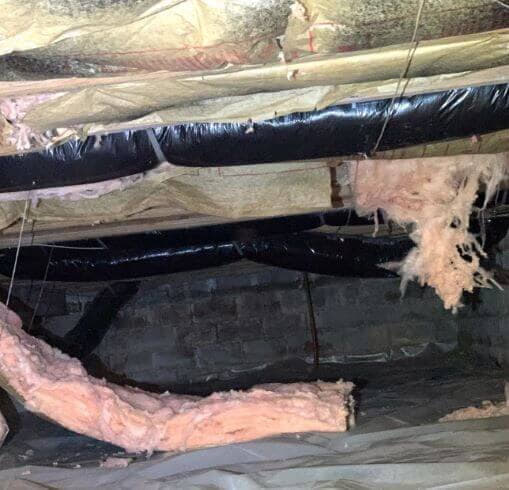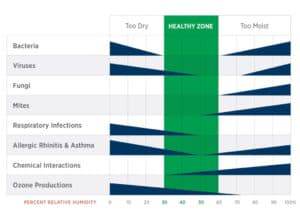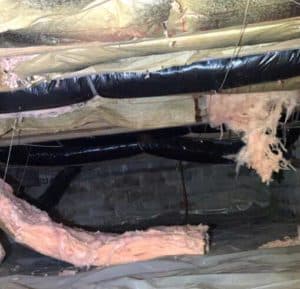10 Ways to Stay Cool and Improve Your HVAC

Originally posted 5/30/18; revised 6/21/21
Here in the Midwest, we often say our weather is unpredictable. I don’t think that’s entirely true. The amount of rainfall varies, and some tornado seasons are more active than others. But you can pretty much guarantee that our summers are going to be hot and humid.
Started in 1996, Acculevel is a family-owned and operated company that specializes in foundation repairs and waterproofing. Our focus is on helping homeowners protect and preserve their greatest investment. We want to help you keep your home as healthy and energy-efficient as possible; our whole-home solutions address your concerns and increase your home’s value.
Staying cool and comfortable in 90° weather with 150% humidity (no, I don’t think humidity can exceed 100%, but it sure feels like it) is a challenge. And while your comfort is of great importance to you, it can sometimes conflict with your financial goals.
In this article, we’re going to focus on ten ways you can improve your HVAC performance as efficiently and economically as possible.
Ten Ways to Stay Cool And Improve Your HVAC Performance
We’re going to start with the HVAC unit itself, then move outward to consider how various components and sections of your home affect its performance.
1. Preventative maintenance.
When was the last time you scheduled a maintenance call for your HVAC system? Just as cars need oil changes and tune-ups, other major pieces of machinery need periodic “check-ups.” During these preventative maintenance appointments, the technician will clean, lubricate, and make adjustments to keep the HVAC in its best condition.
If your HVAC has been running excessively with limited effect, it may need to be charged. It could also be damaged or past its prime. You can also check to see if the HVAC installed is the correct size for your square footage. Maybe the basement has been finished or a room added on since the original installation.
I understand that buying a new HVAC system is a major investment. But using one that is too small or malfunctioning will send your utility bills sky-high. If you need to buy a new HVAC, make sure you check on the possible tax credits available to homeowners.
2. Regular Maintenance
Your HVAC filter needs to be changed regularly. Buy the best quality filter you can for your appliance. It may cost a little more, but higher rated filters block more pollen and debris. This provides the cleanest and healthiest air for you and your family, while also reducing the “gunk” that can build up in your HVAC.
3. Check Your Vents
Go through each room in your home, and assess the vents. Dust or wipe them down, and check that they are opened or closed as you need. This is also a good way to ensure that they aren’t blocked by toys, window decor, or furniture. If you have to place furniture over an open vent, use a vent deflector to redirect the air out from under it.
4. Change the Thermostat
Have you installed a programmable thermostat in your home yet? If so, are you using the program feature? If not, you are missing out on a key opportunity to manage your home’s temperature, reduce the wear and tear on your HVAC, and lower your utility bill. That’s a lot of benefit for a small investment.
For example, if there’s no one at home in the afternoons, you don’t need to maintain the cooler temperature. Program the thermostat to increase the temperature by a few degrees when everyone is out of the house, and schedule it to cool down as people return home.
5. Install a Whole-Home Dehumidifier
If you don’t have a whole-home dehumidifier installed, you should invest in one. A quality dehumidifier will maintain a healthy RHL (relative humidity level) of 50%. This is the optimal level because it won’t support bacterial growth, viruses, fungi, or allergens. If you or someone in your home has severe allergies, asthma, or upper respiratory issues, a dehumidifier can make a real difference in their ability to breathe.
 Information taken from a study performed by ASHRAE (the American Society of Heating, Refrigerating and Air-Conditioning Engineers.)
Information taken from a study performed by ASHRAE (the American Society of Heating, Refrigerating and Air-Conditioning Engineers.)
A dehumidifier comes with other benefits for your HVAC, also. Air with less moisture in it is easier to cool and circulate throughout your home. Dry air also feels cooler than humid air, so you may be able to shave a degree or two off the optimum temperature for your home and still feel comfortable.
6. Cover Windows
Pull curtains closed during the day, or adjust blinds to block out sunlight. It may sound like a small adjustment, but it makes a difference. Window coverings are like decorative insulation for your windows.
If you have pets who look out the windows or like to snooze in the sunbeams, close the blinds but don’t lower them all the way to the sill. That should allow Fido to watch his neighborhood without shredding your window covers. (And hopefully keep your blinds intact!)
7. Assess Your Home’s Insulation
Check for drafts or gaps in the extremes of your home. Is the insulation intact? Is it in good shape? This can be a good way to check for leaks or other signs of trouble in less traveled areas like your attic or crawl space. In particular, if you have fiberglass insulation in your crawl space, you need to consider replacing it with spray foam.
 This photo was taken by an Acculevel project manager during a free estimate appointment. The fiberglass insulation has gotten wet; this causes mold to form and the insulation to fall.
This photo was taken by an Acculevel project manager during a free estimate appointment. The fiberglass insulation has gotten wet; this causes mold to form and the insulation to fall.
8. Cover the Floor in Your Crawl Space
While you’re checking out your crawl space, take a good look at the “floor.” It’s probably dirt, instead of an actual floor, which is often what leads to foundation problems. At the minimum, you should have a vapor barrier installed; this is a plastic liner that blocks moisture and odors from entering your crawl space.
If you have a lot of moisture, or actual water, in the crawl space, encapsulation is a better option. This repair method seals your crawl space against outside intrusions and creates a clean and dry space inside.
9. Schedule Large Appliance Usage
You know your oven gives off a lot of heat when you use it. But many other appliances do this, too. Try to put off running the clothes dryer or dishwasher until evening, when it’s cooler. By limiting how much heat you generate inside the house, you can reduce the HVAC work load.
10. Prepare Meals with Minimum Heat
No, I’m not going to tell you to eat salads all summer! But try to make the most of those smaller countertop appliances you have. Prepare meals in slow cookers or with other more “gadgety” style cooking methods. Or take advantage of those sunny skies and just fire up the grill!
The Next Step
If you’ve found problems in your home while taking any of these steps, you should take prompt action. Home repairs do not get cheaper with procrastination! In fact, putting off repairs usually makes the problems worse and the solutions more expensive.
Does the idea of hiring a repair company make you anxious? I’ve heard horror stories from people who have been cheated by scammers- and it’s those stories that led to our development of this guide: questions to ask a contractor. This article will detail each question, give Acculevel’s answer, and explain why it is important to ask. We want homeowners to be confident in their decision to choose a contractor, and to not be deceived or taken in by poor business practices.
If you need waterproofing or foundation repairs, contact Acculevel. One of our friendly office staff will schedule an appointment for you with an experienced project manager. He or she will evaluate your house and its symptoms, then recommend the best course of action for you, to keep your home strong and healthy for years to come.
Acculevel’s goal is to do the best and most thorough repair possible, to protect and maintain your home. We treat every customer’s home as if it is our own. Allowing our employees into your home demonstrates trust, and we intend to repay that trust with the absolute best in customer service. We are accredited by the Better Business Bureau, have an A+ rating, and average 5 stars on customer reviews.
